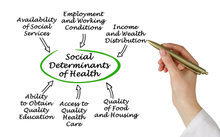Found 325 resources.
0
0
0
The blog post and research on How Housing Matters focus on housing for survivors of intimate partner violence (IPV) and highlight the critical need to go beyond shelter in supporting survivors in overcoming abuse. Domestic violence and housing stability intersect in unique, multifaceted ways. Survivors from marginalized communities face even greater challenges as they navigate toward safety and stability. Promising emerging evidence shows what is working well, yet bringing these resources to all communities cannot be slow. Fully scaling and implementing survivor- and equity-centered...
Topics: Domestic violence, Homelessness, Housing
 Shared by Housing Is
on May 20, 2019
Shared by Housing Is
on May 20, 2019 0
0
0

For many students experiencing homelessness, school is the only place of stability in their lives. Teachers play a crucial role in creating a classroom environment that is safe and supportive for all students, especially those who are highly mobile and have experienced the trauma that often accompanies homelessness. Here, we provide information and strategies that teachers and support staff can use to support the educational success of students experiencing homelessness.
Topics: Child welfare, Education, Homelessness, Housing
 Shared by Housing Is
on May 15, 2019
Shared by Housing Is
on May 15, 2019 0
0
0
Low- and moderate-income families in Puerto Rico would get a significant income boost from the Working Families Tax Relief Act, which would substantially expand the Child Tax Credit (CTC) in Puerto Rico as well as nationally and also help the Commonwealth expand its own, recently implemented Earned Income Tax Credit (EITC). The bill, which Senators Sherrod Brown, Michael Bennet, Richard Durbin, and Ron Wyden introduced recently, would reduce poverty and increase economic security for millions of working families in the United States, including Puerto Rico.
Topics: Child welfare, Legislation & Policy, Low-income, U.S. Territories
 Shared by Housing Is
on May 15, 2019
Shared by Housing Is
on May 15, 2019 0
0
0
Decades of policy choices and insufficient public and private investment have made the infrastructure needs of these communities acute, especially in many communities of color where past policy choices affected by racism, combined with continuing racial bias and discrimination, have resulted in a lack of needed economic resources.
Topics: Community development, Education, Housing, Legislation & Policy, Low-income
 Shared by Housing Is
on May 2, 2019
Shared by Housing Is
on May 2, 2019 0
0
0

Research shows that clinical care is only one factor that impacts population health and that a collection of other factors – including the natural and built environment where people live, education economic stability, food, and community and social context – grouped under the term social determinants of health (SDOH), have significantly more influence on care utilization, outcomes, and population health. Together, these factors account for 60% of preventable mortality.
Topics: Child welfare, Early childhood, Health, Low-income, Medicaid / Medicare
 Shared by Housing Is
on May 2, 2019
Shared by Housing Is
on May 2, 2019 0
0
0
Focusing on traditional neighborhood measures such as disadvantage and segregation rarely reveals how specific policies, powerful decisionmakers, and institutions built on racial hierarchy generate and maintain racial health disparities. To help researchers, policymakers, and practitioners consider how best to recognize and incorporate structural racism in the study of place-based health disparities, this literature review highlights four lessons researchers can use to more directly study the connection between structural racism and health.
Topics: Health, Racial inequalities, Research
 Shared by Housing Is
on May 2, 2019
Shared by Housing Is
on May 2, 2019 0
0
0
Moving Health Care Upstream (MHCU) is based on the belief that health systems can address persistent and costly health inequities by moving “upstream”—beyond the walls of hospitals and clinics and into the communities, collaborating with community-based organizations to address the root causes of disease. The various areas of work within MHCU share a common focus-supporting hospitals and community stakeholders in testing and spreading strategies to move upstream, and sharing “what works” to inform the field and accelerate the upstream movement in the field as a whole. Policy Learning Labs are...
Topics: Child welfare, Early childhood, Food insecurity, Green, Health, Housing, Legislation & Policy, Nutrition, Partnerships, Youth
 Shared by Housing Is
on May 1, 2019
Shared by Housing Is
on May 1, 2019 0
0
0

When following the mother–child pair from pregnancy through five years postpartum, the estimated cost is $14.2 billion for births in 2017, or an average of $32,000 for every mother–child pair affected but not treated.
Topics: Dual-generation, Early childhood, Mental health, Pre-natal, Research
 Shared by Housing Is
on Apr 30, 2019
Shared by Housing Is
on Apr 30, 2019 0
0
0
Sweeping changes designed to make the food more nutritious in a federal assistance program for low-income families reduced the risk for obesity for 4-year-olds who had been on the program since birth, according to new research.
Topics: Early childhood, Food insecurity, Low-income, Nutrition, Obesity, Research
 Shared by Housing Is
on Apr 29, 2019
Shared by Housing Is
on Apr 29, 2019 0
0
0

Are you a Pennsylvanian without a high school diploma? Then sign up with AmeriHealth Caritas for Medicaid and the plan will help you get your GED. Having trouble getting a job in Ohio? If you are enrolled in CareSource, the Life Services JobConnect in CareSource’s managed care organization (MCO) will arrange job coaching and other employment services at no cost. These are not examples of corporate philanthropy. Rather, they reflect a growing recognition in the health care sector, especially among managed care organizations, that good health—and achieving lower medical costs—requires a focus...
Topics: Education, Food insecurity, Health, Housing, Low-income, Nutrition, Research
 Shared by Housing Is
on Apr 25, 2019
Shared by Housing Is
on Apr 25, 2019 0
0
0
Parent involvement is associated with child academic outcomes, positive behaviors, and social skills. This qualitative study explored school-based parent involvement barriers experienced by nine low-income mothers. In-depth interviews were used to collect data from mothers participating in a community-based program offered in a large public housing neighborhood. Findings included three main barriers: (a) cultural and language differences in their children’s school, (b) undertones of racism from teachers and parents, and (c) being the primary caregiver or sole provider for their children....
Topics: Education, Family engagement, Housing, Low-income, Racial inequalities, Research
 Shared by Housing Is
on Apr 25, 2019
Shared by Housing Is
on Apr 25, 2019 0
0
0
Adequate, safe, and affordable housing is one of our most basic needs. But in the US, access to housing is not guaranteed. Demand for affordable housing is growing, especially as housing costs increase beyond wage growth in many communities. Hospitals and health systems are stepping in to help fill this gap. Because of their mission orientation, the importance of stable housing on health outcomes, and policy changes initiated by the Affordable Care Act, hospitals and health systems are increasingly investing in and supporting the creation of affordable housing in their communities.
Topics: Affordable Care Act, Community development, Health, Housing, Low-income
 Shared by Housing Is
on Apr 25, 2019
Shared by Housing Is
on Apr 25, 2019 0
0
0

The Centers for Medicare and Medicaid Services (CMS) and states spend over $300 billion per year on the care of dually eligible individuals, yet still do not achieve acceptable health outcomes. In a 2016 study of social risk factors in the Medicare value-based purchasing programs, dual enrollment status was the most powerful predictor of poor outcomes. For example, relative to Medicare-only beneficiaries, dually eligible individuals had 10-31 percent higher risk-adjusted odds of hospital readmission across conditions measured in the Hospital Readmissions Reduction Program, and scores were...
Topics: Dual-eligibles, Funding, Health, Low-income, Medicaid / Medicare, Research, Seniors
 Shared by Housing Is
on Apr 24, 2019
Shared by Housing Is
on Apr 24, 2019 0
0
0
Serious mental illness (SMI) is a disabling condition that develops early in life and imposes substantial economic burden. There is a growing belief that early intervention for SMI has lifelong benefits for patients. However, assessing the cost-effectiveness of early intervention efforts is hampered by a lack of evidence on the long-term benefits. We addressed this by using a dynamic microsimulation model to estimate the lifetime burden of SMI for those diagnosed by age twenty-five.
Topics: Disabilities, Education, Low-income, Mental health, Research
 Shared by Housing Is
on Apr 23, 2019
Shared by Housing Is
on Apr 23, 2019 0
0
0
Consistent with Executive Order 13853, “Establishing the White House Opportunity and Revitalization Council,” this document informs the public that HUD intends to maximize the beneficial impact of investment in Opportunity Zones. HUD is reviewing its existing policies, practices, planned actions, regulations, and guidance regarding HUD-administered programs and laws to identify actions HUD can take to encourage beneficial investment, both public and private, in urban and economically distressed communities, including qualified Opportunity Zones. HUD seeks input and recommendations from the...
Topics: Community development, Legislation & Policy
 Shared by Housing Is
on Apr 23, 2019
Shared by Housing Is
on Apr 23, 2019 0
0
0
This report presents a case study of the Chicago Housing Authority’s (CHA’s) work requirement policy, one of a small number of work requirements implemented by housing authorities. The report describes the CHA work requirement, the policy’s implementation and how it has changed, and perceptions of implementation and outcomes from key CHA and service provider staff and residents. The CHA work requirement has been in place for nearly 10 years, allowing us to analyze implementation over time and outcomes.
Topics: Asset building, Legislation & Policy, Low-income, Midwest, Research
 Shared by Housing Is
on Apr 23, 2019
Shared by Housing Is
on Apr 23, 2019 0
0
0

When it comes to the federally funded Afterschool and Summer Meal Programs, what is the trick to engaging teens better? Across the country, both anti-hunger advocates and out-of-school time program providers are asking themselves this very question.
Topics: Food insecurity, Nutrition, Youth
 Shared by Housing Is
on Apr 22, 2019
Shared by Housing Is
on Apr 22, 2019 0
0
0
Housing and land use policies have a significant effect on schools, and since these policies are usually decided at the state and local level, educators and education advocates have the opportunity to play a significant role. Housing and land use policies can affect enrollment trends, concentrations of poverty and school diversity, school funding, stability of enrollment vs. “churning” of students, and ability of students to complete their homework and focus during the school day.
Topics: Child welfare, Education, Housing, Legislation & Policy
0
0
0
A growing body of research suggests that housing eviction is more common than previously recognized and may play an important role in the reproduction of poverty. The proportion of children affected by housing eviction, however, remains largely unknown. We estimate that one in seven children born in large U.S. cities in 1998–2000 experienced at least one eviction for nonpayment of rent or mortgage between birth and age 15. Rates of eviction were substantial across all cities and demographic groups studied, but children from disadvantaged backgrounds were most likely to experience eviction....
Topics: Early childhood, Homelessness, Housing, Low-income, Racial inequalities, Research
0
1
1

In 2015, the Supplemental Nutrition Assistance Program (SNAP) prevented 8.4 million people from living in poverty. This essential and effective safety net program helps people with low incomes purchase food for themselves and their families—an estimated 40.8 million Americans were living in poverty in 2015; absent SNAP benefits, that number would have been 49.1 million. Despite its success, SNAP is facing rule changes that would cause people to lose benefits—harming those who need it most and weakening the poverty-fighting power of the program.
Topics: Food insecurity, Health, Legislation & Policy, Low-income, Nutrition
0
0
0

Founded in 1995 as Project Women, Family Scholar House (FSH) provides comprehensive, holistic services for disadvantaged single parents, their children, and foster alumni. The nonprofit seeks to end the cycle of poverty and transform communities by empowering families and youth to succeed in education and life-long self-sufficiency. FSH provides supportive housing, educational programming, and participant advocacy to help families gain independence.
Topics: Dual-generation, Early childhood, Education, Homelessness, Housing, Low-income, Partnerships, Place-based, Post-secondary, South, Stability
0
0
0
To what extent is there a mix of incomes within the LIHTC complexes? Is it realistic to expect properties without an explicit mixed-income focus to create and sustain mixed-income communities?
Topics: Housing, Low-income, Research
 Shared by Housing Is
on Apr 17, 2019
Shared by Housing Is
on Apr 17, 2019 0
0
0
The role of public and nonprofit hospitals and hospital systems in supportive housing is not an obvious one at first glance. Traditionally, the role of nonprofit and public hospitals has been to provide primary healthcare and additional health services to the public, often to select “catchment” areas or neighborhoods. The extent of these institutions’ role in housing was limited to either providing a) short-term inpatient beds for medical or treatment services, or b) residences for nurses or other hospital staff. Why then are more and more nonprofit and public hospitals becoming involved in...
Topics: Health, Homelessness, Housing, Partnerships, Research, Supportive housing
 Shared by Housing Is
on Apr 17, 2019
Shared by Housing Is
on Apr 17, 2019 0
0
0

April is National Child Abuse Prevention Month, an opportunity to recognize the importance and raise awareness of our roles —families, communities, service providers, researchers, policy makers and others— in working together to prevent child abuse and neglect and to promote the overall social, physical, and emotional well-being of children and their families.
Topics: Child welfare, Family engagement, Health, Homelessness, Housing, Safety
 Shared by Housing Is
on Apr 17, 2019
Shared by Housing Is
on Apr 17, 2019 